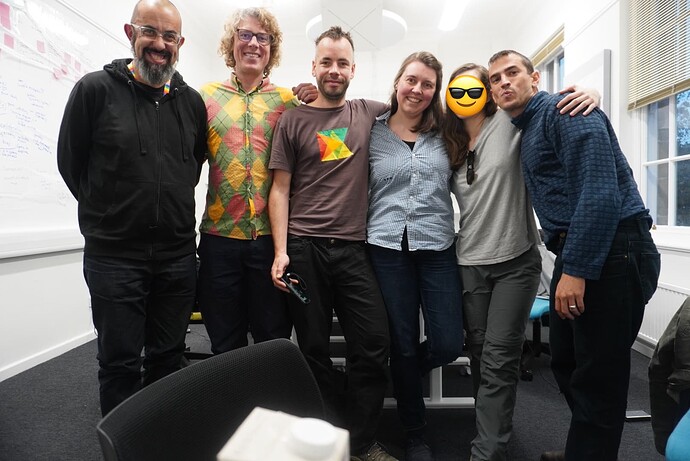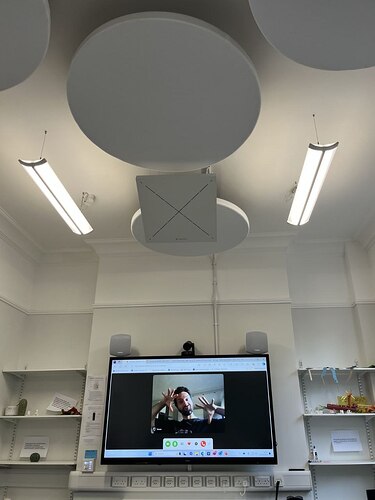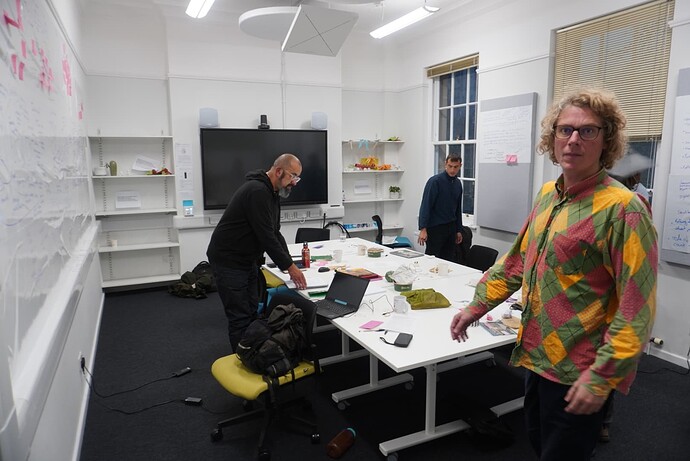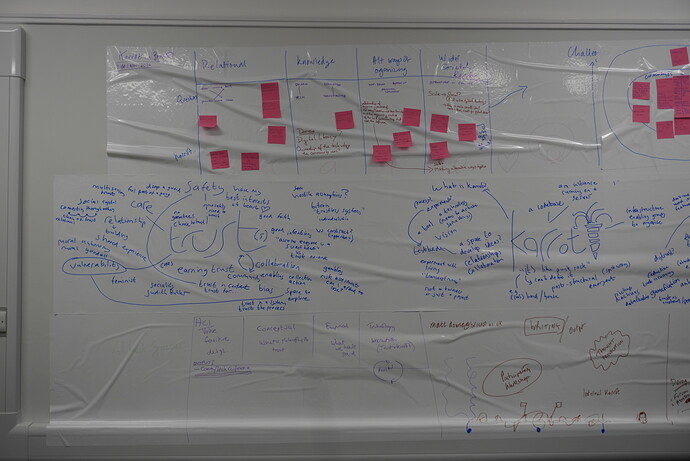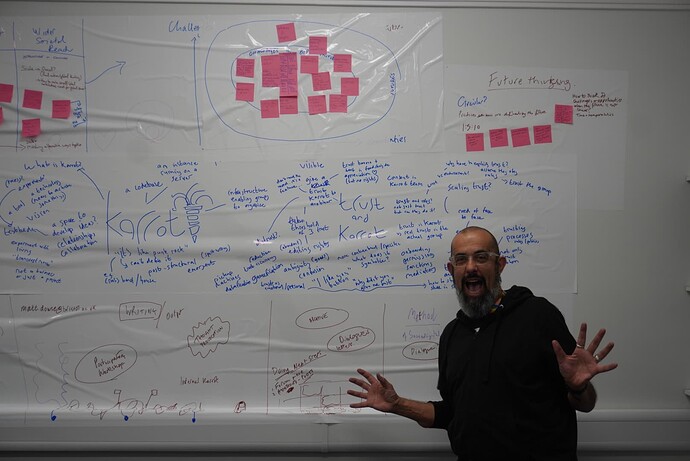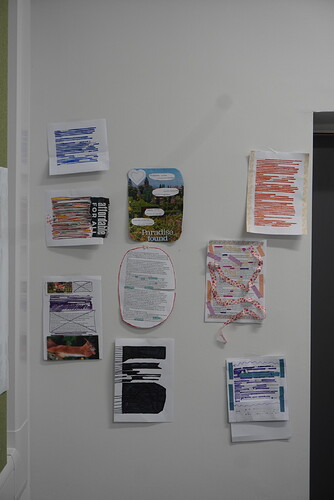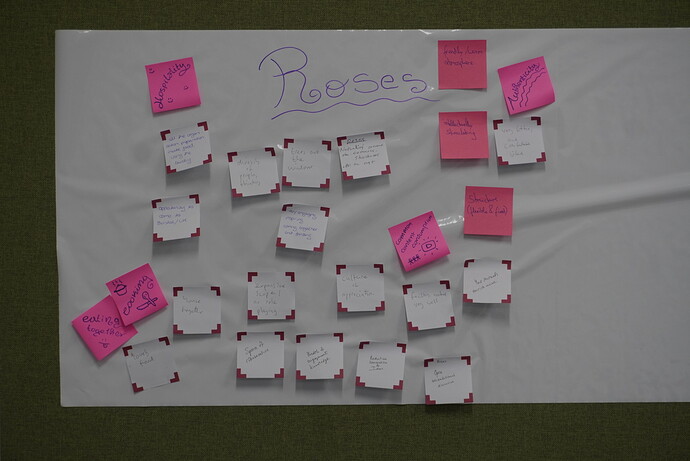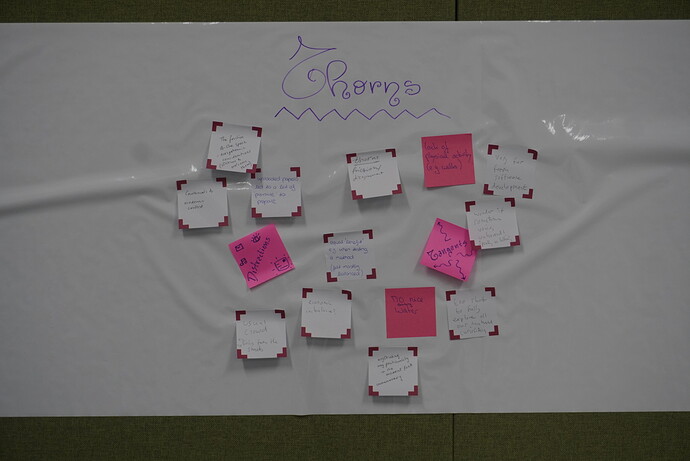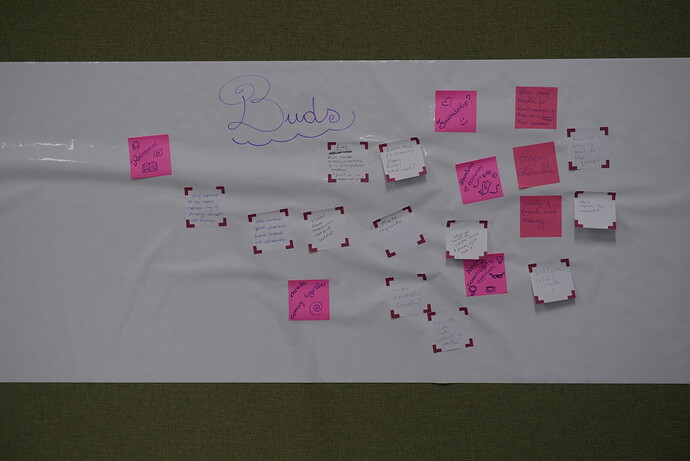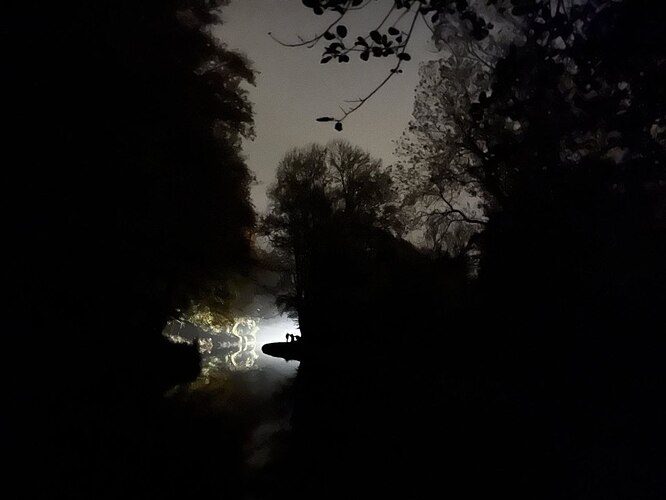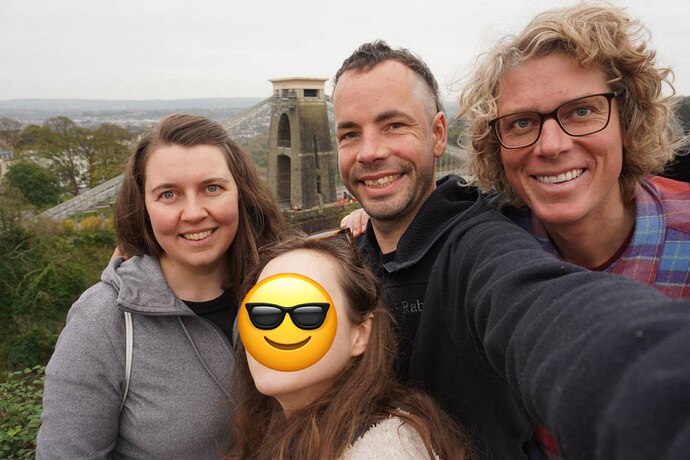Participants: Jay, Vasilis, Nick, Nathalie, Philip (aka Butze), Bruno, Matt
Location: Bristol UK and around
When: November 2024
Keeping up with our tradition of meeting outside our regular weekly calls (General Call and Co-Working, which take place online), the Karrot-team occasionally plans other gatherings, some online, and here and there, some in person. After the online community gathering of Karrot Days in 2022, and the Siegen Days, where some of us met in Germany, hosted by the University of Siegen, this time we came together in person once again in Bristol, in November 2024.
This forum post is dedicated to Bristol Days.
And if you’re wondering why it took us so long, now already at the end of April 2025, the answer is rather simple: Vasilis (myself), one of the members of the Karrot-team, in charge of this post was going through a “winter period” (something typical among Karrot contributors), hibernating after experiencing low motivation and burnout feelings following the intense work of submitting his PhD.
After being invited by Matt Dowse, Senior Research Associate at the Centre for Sociodigital Futures (CENSOF) at the University of Bristol, we accepted the opportunity to join a two-day workshop on Community Tech and (grassroots) community innovations; a topic of interest to Matt and us alike.
Karrot was proposed as a case study for Matt’s research, but we also thought that the gathering could offer a space for the Karrot-team to come together in person, with some expenses covered by University of Bristol funds. In avoiding ‘research extractivism’, we collaborated with Matt to design a two-day programme that could support his research and the Karrot-team alike, as a grassroots community of designers, developers, and HCI researchers.
Evening before Day 1: Food, Drinks, AI podcast, laughs and some first Stosslüften-ing
We arrived in Bristol from different parts of Europe: Greece, UK, Germany, and Luxembourg. For some of us, it was the first time meeting in person after working together since years. Those who arrived earlier had already cooked some food and had bought some wine. While it initially felt a bit awkward being together face-to-face, we quickly moved past that. Although we had originally explored the option to stay in a housing cooperative in Bristol, we ended up booking a fancy-looking, but poorly designed (from a user’s perspective) Airbnb.
After dinner, we decided to skip the idea of going to the pub that same night and instead stayed in, to prepare for the next day’s activities. Later that evening, while sharing some drinks in the living room, we decided to skim through the manuscript (now published) that Matt had been working on about Community Tech, which he had asked us to have a look at. While we did so, we also experimented with AI, turning the manuscript into a podcast, although the result was pretty terrible, with AI voices sounding so enthusiastic about Community Tech that it almost felt like they were ridiculing the whole idea.
While listening to the AI generated podcast the fist Stosslüften took place coordinated by Nathalie and Butze who widely opened all the windows for 2-3 mins to freshen the air in the room. Stosslüften-ing quickly became both a routine and an inside joke throughout our trip and gathering. On a more symbolic level, the Karrot Bristol Days, along with our encounter with Matt, felt like a Stosslüften for the project itself, a refreshing burst of new energy, ideas, buds and flowers and friendships.
Day 1
At 9 a.m. sharp, Matt was waiting for us at the main entrance of CENSOF. After greetings and introductions at the door, he gave us a tour of the facilities. It wasn’t a fancy, flashy office full of glass walls and computers everywhere, but had a cozy, welcoming and warm atmosphere. After dropping off our things in the room we headed to the kitchen to grab some coffee and tea. The first Stosslüften of the day was already taking place as someone had cracked open the windows to let in some fresh air before we officially started. Was that Philip?
With that occasion, we took the chance to explain to Matt what Stosslüften is all about. With our cups full, we gathered around the table and we talked through the preliminary schedule we had sketched for the two days. We also got Bruno online, with his face appearing on a massive screen in the workshop room.
Following our Karrot etiquette and rituals, we started with a check-in as always. We each shared how we were feeling, how we had slept, our expectations for this gathering, and anything else we wanted to bring into the space. Matt did his round too.
Next, Matt shared about his background in organisational studies and previous work in the 3rd sector (i.e., charities), his current work on Community Tech in the UK, and the broader work of CENSOF that closely aligns with other streams within Human-Computer Interaction (HCI), such as Civic Tech and Digital Civics, which in short, focus on supporting communities to design and use technologies that can serve people’s needs rather than market demands.
Also, as Matt noted Community Tech is giving communities’ the right to have a say and impact in shaping the future (i.e., futuring) of digital technologies while exploring and bringing to the surface real world innovations that unfold “day-to-day in neighbourhoods, on high streets and in local communities, powered by ingenuity, experimentation, and the adaptation and reuse of existing technologies” as stated in Matt’s and Rachel’s manuscript: What good is innovation if it doesn’t work for everyone?
Following this setting-the-scene section on Community Tech, which generates benefits for communities, and deals with real life issues against “technologies that eject us anywhere but the drawn-out present” a phrase attributed to Lola Olufemi critiquing modern technologies, we had a short open sharing discussion before jumping into Karrot. More specifically, we touched on the four preliminary themes of Community Tech presented by Matt: relationality; knowledge of the technologies we use; alternative organisational methods and models that avoid mimicking business models; and achieving broader societal impact. We later on used the same themes to map out where Karrot is currently positioned under those and how Karrot could evolve under these lenses.
Karrot does share commonalities with Community Tech as Matt had pitched it and with this kind of ‘real word’ innovations as described above. In this next session for the day focusing mostly on Karrot, Matt was interested to learn about the challenges we face such as operational ones, or more philosophical ones, and discuss about Karrot’s future, how we think of it, how we bring it to the present through prefigurations (if so), and also how we, the Karrot-team, ever hold any kind of futuring sessions!
In short, we brought to the table Karrot’s (counter) culture, emphasising how we work as a group, make decisions through consent, use a needs-based system to redistribute the funds we have acquired, and stick to community rituals such as our check ins and check outs; practices which can be seen as prefigurative attempts to make the future we aspire to in the present, using the means available to us today. We also addressed issues such as funding fatigue (i.e., chasing funding from institutions) and the challenge of achieving financial sustainability, alongside strengthening the communities that Karrot aims to support by improving and deepening our relationships with them.
Additionally, we shared with Matt our 1-5-10 years exercise, we had previously undertaken to imagine different possible futures for Karrot over the next 1, 5, and 10 years.
This second session provided a solid foundation for Matt to better understand who we are and the work we’ve been engaged in, while also giving us an opportunity and a dedicated space to summarise and reflect on our efforts under the theme of community innovation(s).
It was time for our first break, followed by a couple of rounds of Stosslüften. We refilled our coffee cups and headed to a nearby small park for a falafel lunch, and Matt gave us a tour of the University of Bristol facilities scattered around the park.
Approximately 45 minutes to an hour later, we came back together for our next session on trust, a topic of particular interest to Matt. Bruno was also virtually present once again for this session. Trust is indeed a broad and multifaceted concept, and Matt was keen to explore various dimensions of trust in the context of Community Tech. Matt was interested in understanding how we perceive trust, how we establish trust among ourselves, and how we build trust with the communities using Karrot. Also in understanding how trust influences decision-making processes, collaboration with communities and other projects, and in discussing the technologies implemented in Karrot that are designed to support building trust; some of which are ‘hardcoded’ yet often bypassed by communities using Karrot in favor of more ‘situated’ trust-building methods.
The discussions that followed delved into the plurality of trust. We recognised that trust is not monolithic; individuals may be trusted for different reasons and in varying contexts. For instance, someone might be trusted to handle technical tasks but not necessarily for something else. It was during this session that Matt brought out some A1-size papers to use for mapping our thoughts regarding trust.
So, Matt took the lead and wrote the word ‘trust’ in large letters on the A1 sheet.
We very soon after added an “(s)” to turn it into trust(s), opening it up to multiple meanings.
From there, we started surrounding trust(s) with words and phrases such as: safety, relationships, caring, vulnerability, collaboration, earning trust, bias, good faith, moral exchange, shared experience, trust in a system, trust in a process, good intentions & “assuming everyone is a sweetheart”, blockchain trustless systems, feeling part of a ‘gang’ and more.
Next to trust(s) we also made another blob with Karrot in the middle, and then another one entitled Karrot and trust(s). Around Karrot we added things such as, an instance running on a server, a tool for achieving something, a digital infrastructure enabling communities to orgnanise, an experiment with transvestement (i.e., getting money from the mainstream economy to feed an alternative one), a testbed to try out ideas and processes and more.
Around Karrot and trust(s), we shifted our focus to Karrot’s built-in trust system, reflecting on feedback collected from the communities using it; mostly foodsaving and sharing communities. We noted the existing three-trust-karrots threshold system, highlighting how some communities either bypassed it, found it confusing, or treated it like a “facebook like” button. We also referred to processes of endorsement and trust-building, along with how roles and permissions are shaped by Karrot’s trust system. A distinction was made between trusting Karrot itself and trusting the communities using Karrot, as well as trust in the internal to each community, processes and agreements that are put in place. Sanctions and the idea of trust currencies as ways to gamify and “datify” (i.e, turn something into structured data, making it measurable, trackable, or analyzable) participation were also shared, and we also touched on phenomena (nurtured indirectly by Karrot’s system in place) such as the pickup machine one, where energy and motivation can be driven towards saving food that would otherwise be wasted, potentially at the expense of engagement in other activities that can be also more proactive and more oriented toward community building and organising.
After an hour of putting down things on the trust map, we wrapped up the session without reaching any concrete outcomes, at least not for the day. Nonetheless this has not been the purpose of this session.
Well! Good luck to Matt in making sense of all this ‘data’!
After another cup of coffee and a Stosslüften round, we got back in the room for the final session of the day.
“6G what???”
Our final session was on 6G, presented by Leona, another researcher from CENSOF. She introduced us to 6G technologies, essentially, faster connections that can support even greater levels of interconnectedness of IoTs, and so on. This session felt a little off-topic; 6G seemed too futuristic and abstract to consider in any practical way. Plus, by that point, we were tired and already thinking about heading to the pub which would come next.
But before heading to the pub, we held a round of check-outs, sharing our feelings and some key takeaways from day 1. Stossluften definitely did its job as a few ‘fresh’ ideas and reflections were already starting to surface.
And…after a long day, finally pints at the pub, one of the few independent ones near the university and close to where we were staying.
Day 2
Knowing the way to CENSOF facilities, we made our way there, up and down Bristol’s small hills. By 9 am, we were back in the building, topping up our coffee and tea cups before heading to the workshop room for our morning check-in.
Following our slow pace check-in, we started the fist session for the day: Round table Essay discussion of Matt’s and Rachel’s text: What good is innovation if it doesn’t work for everyone?. We finally revealed to Matt our ‘rich’ approach engaging with the text, which included not just reading it, but also transforming it into an AI podcast. We had another round of laughs about the podcast and the AI podcasters who very enthusiastically discussed Community Tech and community innovations. We had a round of sharing thoughts and ideas, some of which were added as blobs and notes to the wall map we had started the day before.
After this session, possibly due to my long hibernation, I am not very sure what we did next. But most probably, it seems that we jumped straight into skimming through, and reflecting on Towards a Future of Tech: A People’s Guide to Tech, another text/report that Matt had enthusiastically shared with us. The main points of the text, are summarised in the five truths of technology as outlined below:
-
Technology is Transformative – Technology reshapes society, changing norms and possibilities in ways we often don’t anticipate.
-
Technology is Cyclical – Tech innovations often replicate existing inequalities rather than eliminate them, rooted in historical systems of power.
-
Technology is Relational – No piece of technology stands alone; it is interconnected with people, histories, and natural systems.
-
Technology is Natural – All tech depends on natural resources and ecosystems, debunking the myth of a separation between “tech” and “nature.”
-
Technology Holds Many Futures – The future is not inevitable or predetermined; it can and must be collectively shaped.
Pressed for time, we quickly wrapped up this session, and two other researchers from CENSOF then joined us, happy to hear that we were available to try out their future-thinking methods, which they would then explore with other local based groups in Bristol, the following days. One of the tasks they gave us was to imagine a future technology, low, intermediate, or high, anything was OK, and present it to the group. Afterwards, they handed us lots of different materials, like magazines, markers, and post-its, and prompted us to create a poem or even a manifesto that somehow connected to futures-thinking and technology.
It was definitely a fun and lively session, and we also took time to share some reflections. A recurring theme in the conversation was a questioning of the process itself: do speculative, future-oriented imagination sessions like these can lead to meaningful insights, or do they simply create a kind of abstract space where people feel free to let their minds wander, sometimes in ways that don’t really make much sense?
We also found ourselves chatting about Afrofuturism, exploring how it envisions futures rooted in Black cultural experiences and histories, and how it can serve as a powerful tool for imagining alternative futures that challenge dominant narratives.
It was finally time for a short break. We headed out to the small back garden opening a door that was one of those high-tech ones, with no handles but buttons and RFID cards. However, to keep it open and not having Matt coming down every time, we simply blocked it with a wedge or a bin; something we noticed the cleaning staff were also doing. We found ourselves commenting on these kinds of lo-fi design interventions and affordances; the everyday hacks people do to work around supposedly well-designed, ‘smart’ systems.
After some more caffeine, fresh air, and a few body games that Butze and Nick played in the garden, we headed back into the already ‘stossluften-ed’ workshop room, whose walls were getting more and more filled with notes and blobs. Once again, good luck to Matt with deciphering all of that!
Back in the workshop room, we were joined remotely by Dan McQuillan, who appeared on the big screen in place of Bruno. Matt had invited Dan to present his work on artificial intelligence, drawing from his book Resisting AI: An Anti-fascist Approach to Artificial Intelligence. Dan spoke passionately about the need to resist AI, a theme he emphasized repeatedly throughout his talk.
The bottom line regarding Dan’s talk was that if AI is the answer to some sort of problem, then the problem set is the wrong problem. For example if jail is the answer to a problem then an AI powered justice process is the wrong one. And similarly, regarding our topic centering around Community Tech he noted that the prospects for community-driven AI seem slim, as the massive resource demands required to build and maintain AI systems make it unlikely that they can be developed outside of corporate infrastructures today, considering that AI models are trained through large-scale processes rather than through community-driven initiatives. Given that, Dan concluded that people interact with AI systems without truly understanding how they work or why they produce the outputs they do.
Following this session, it was time to begin wrapping up our two-day gathering of collective futuring and Stosslüften-ing, as we started exploring the next steps.
Several ideas were thrown on the table, on how we move on from here, and we opened the space for reflections.
-
How was this experience for each of us? And what were the dynamics of this session?
-
What insights or feedback do we carry (takeaways), particularly in light of possible collaborations with the academia?
-
How we can strengthen ties with other initiatives found in the Community Tech wave, possibly through Matt, considering his research interests and engagement with the Community Tech space in the UK?
-
How we move on to better resource Karrot and other Community Tech projects through ‘transvesment’ strategies?
-
How we, Community Tech people along with academics, such as Matt engage in ‘lobbying’ activities to support policy changes that can show the ‘value’ and ‘growth’ nurtured in community innovations and therefore drive support material and financial towards such endeavors?
-
How we sustain our collaboration with Bristol Uni, Matt and CENSOF in particular in the long run? Could we have another gathering such as this one in March?
-
Is there something we can write together? An academic paper? A report? A blogpost?
Numerous reflections and ideas were shared. From using Karrot to support the Community Tech Network in the UK as a coordination tool, exploring the possibility to get some more funding through CENSOF to support another Karrot days event, writing some project proposals wherein Karrot can be presented as a partner/collaborator, exploring more local to Bristol and the surrounding area case studies that would benefit from using Karrot, exploring how Community Supported Software, a conceptual organisation framework that emerged from Karrot, could be further developed through research on Community Tech, and more.
Finally, to close the ideas sharing session, we used the rose, thorn, bud framework proposed and coordinated by Nick, celebrating what flourished (roses), noticing challenges (thorns), and pointing to future opportunities (buds).
Roses included things such as; hospitality (on behalf of Matt), structure (being flexible but firm), being concerned over issues of power, and consent, our two day gathering being intellectually stimulating. Other roses of a different aroma, included cooking and eating together, having trees outside of the windows our two-day gathering took place at, engaging in a rich spectrum of conversations and more.
Thorns, included things such as lacking physical activities and being a space which despite cosy can impose conformity, having an interesting angle but staying away from the actual software development which is the backbone of Community Tech at the end of the day, having papers to read that to some of us gave pressure, not having processes that could develop creative friction and discourses, being a usual crowd holding some privileges and missing out ‘voices from the ground/street’, feeling to short to explore all our curiosities, and more.
Finally buds, included things such as having access to a lot of resources to dig into, the possibility of establishing an ongoing collaboration with Matt, recognising the stability of physical Karrot meetings, opportunities to bring such workshops in the wild and involve communities working on the ground, and sustaining our friendship with Matt alive!
After this session, it was time for our final check-out which was followed by another visit to the same pub as the night before!
In summary, stosslüften: letting fresh air in, to clear and refresh a space, proved its value. And took shape in the way we opened up to one another, sharing vulnerabilities, visions, anxieties, and often sober and more tipsy aspirations. A new friendship with Matt was recognised as a promising bud, for which we’re very grateful. For his generous and warm hosting, for his non extractive approach, and for creating the space where the Karrot-team came together.
As our time in Bristol was coming to an end, we didn’t say goodbye (except for Matt) as the next day, we packed our stuff and we were all off to a new place nearby Bristol, surrounded by nature and water, where we’d spend the next four days singing, dancing, drinking, swimming, cycling, and digesting of our Bristol Karrot days gathering.
Post Bristol days
After our shared time in Bristol, Matt joined our Karrot team and the Feedback group, and gradually started joining our weekly co-working sessions.
Moreover, a series of reflective email exchanges took place, exploring ways we could continue our collaboration.
Taking a more locally focused direction, Nick and Matt began working with Bountiful Bristol, an initiative aimed at connecting local growers, allotment holders, and community members to share surplus produce, grow food intentionally for donation, and promote food justice throughout the city, the members of which are currently experimenting with using Karrot as part of their coordination efforts:
Matt, Vasilis, and Butze, together with some other HCI and CSCW researchers, collaborated on a paper for the Communities and Technologies 2025 conference. The paper focuses on Community Supported Software (CSS), a conceptual organisational framework for Community Tech initiatives, born out of our Karrot discussions, which draws inspiration from the model of Community Supported Agriculture (CSA); where consumers participate in the food production sharing both the risks and rewards with farmers involved. While the paper was rejected this time, we 'll rework our manuscript and try another venue in the near future.
